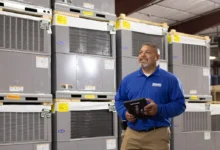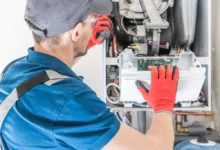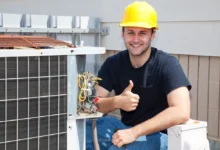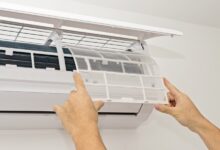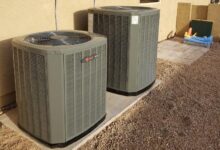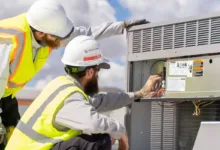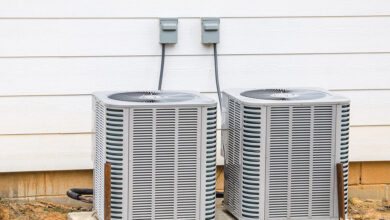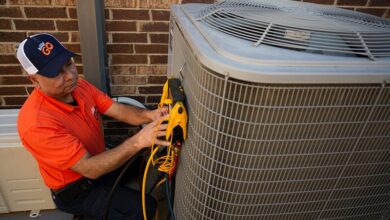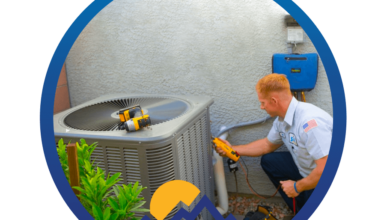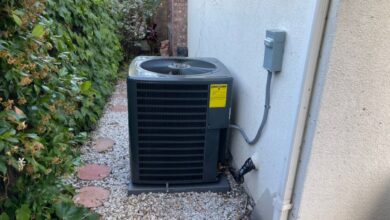HVAC Repair in San Diego: Choosing the Right HVAC Repair Service
HVAC Repair San Diego – Welcome to our comprehensive guide on HVAC repair in San Diego! If you’re a homeowner or business owner in this beautiful city, it’s important to understand the ins and outs of HVAC systems and how to keep them running smoothly. In this article, we’ll cover everything from common HVAC issues to finding the best repair services in San Diego. So, whether you’re dealing with a malfunctioning air conditioner or a faulty furnace, we’ve got you covered!
San Diego’s climate is known for its mild winters and warm summers, making HVAC systems an essential part of everyday life. However, even the most well-maintained systems can experience issues over time. That’s where professional HVAC repair services come in. Our goal with this guide is to equip you with all the information you need to make informed decisions about your HVAC system and ensure you find the right repair services to meet your needs.
Understanding HVAC Systems: A Brief Overview
When it comes to HVAC systems, understanding how they work and their various components is crucial. HVAC stands for Heating, Ventilation, and Air Conditioning. These systems are designed to regulate temperature, humidity, and air quality in indoor spaces. Let’s take a closer look at the different components that make up an HVAC system:
Heating
The heating component of an HVAC system is responsible for providing warmth during colder months. It typically consists of a furnace, boiler, or heat pump. Furnaces are the most common heating systems in San Diego homes and use natural gas, propane, or electricity to generate heat. Boilers, on the other hand, heat water or produce steam to warm the space. Heat pumps are versatile systems that can both heat and cool a building.
Ventilation
Ventilation is essential for maintaining indoor air quality and preventing the buildup of pollutants, odors, and excess moisture. It involves exchanging indoor and outdoor air, ensuring a constant flow of fresh air while removing stale air. Ventilation systems can range from simple exhaust fans to more complex systems that use heat recovery ventilation to improve energy efficiency.
Air Conditioning
San Diego summers can be scorching, making air conditioning a necessity. Air conditioning systems work by removing heat and moisture from indoor air, providing cool and comfortable temperatures. The most common type of air conditioner is the central air conditioning system, which uses ductwork to distribute conditioned air throughout the building. Ductless mini-split systems are also popular, offering flexibility and zoned cooling.
Understanding these components and how they work together is the first step in troubleshooting HVAC issues. It allows you to identify the source of the problem and communicate effectively with HVAC repair professionals.
Common HVAC Problems and Troubleshooting Tips
Even the most reliable HVAC systems can experience problems from time to time. Understanding common issues can help you troubleshoot minor problems on your own or know when it’s time to call in the professionals. Let’s explore some of the most common HVAC problems and their potential causes:
Poor Airflow
If you notice weak airflow coming from your vents, it could be due to a clogged air filter, blocked ductwork, or a malfunctioning blower fan. Start by checking and replacing your air filter if it’s dirty. If the problem persists, it’s best to have a professional inspect your ductwork and blower fan to ensure proper airflow.
Strange Noises
HVAC systems should operate quietly. If you hear unusual noises such as banging, grinding, or squealing, it could indicate a problem. Loose or damaged components, worn-out belts, or a faulty motor could be the culprits. It’s essential to address these issues promptly to prevent further damage and avoid potential system failure.
Inefficient Cooling or Heating
If your HVAC system fails to cool or heat your space efficiently, it may be struggling to reach the desired temperature. This could be due to a variety of reasons, including refrigerant leaks, dirty coils, or a malfunctioning thermostat. Regular maintenance and cleaning can help prevent these issues, but it’s important to consult a professional if the problem persists.
Frequent Cycling
Short cycling, where the HVAC system turns on and off frequently, can be a sign of an underlying issue. It could indicate an oversized or undersized system, a malfunctioning thermostat, or blocked airflow. A professional can assess the problem and recommend the appropriate solution to ensure your system operates efficiently.
Foul Odors
If you notice unpleasant odors coming from your HVAC system, it’s essential to address them promptly. Musty or moldy smells could indicate mold growth in your ductwork or a damp filter. Burning or electrical odors might signify a wiring issue or overheating components. These issues not only affect indoor air quality but can also be a potential health hazard, so it’s crucial to have them investigated by a professional.
Uneven Temperature Distribution
When certain areas of your home or building feel significantly warmer or cooler than others, it could be due to an imbalance in your HVAC system. This imbalance can be caused by various factors, including ductwork issues, improper system sizing, or a malfunctioning thermostat. A professional can assess the situation and recommend the appropriate steps to achieve balanced temperature distribution.
High Humidity
San Diego’s coastal climate can sometimes lead to high humidity levels, which can make your space uncomfortable and promote mold growth. HVAC systems are designed to control humidity levels, but if you notice excessive moisture, it could indicate a problem. A malfunctioning dehumidifier or issues with the condensate drain line may be to blame. Having a professional inspect your system can help resolve the issue and ensure optimal humidity control.
System Failure
If your HVAC system fails to turn on or experiences a complete shutdown, it’s important to investigate the cause. A tripped circuit breaker, a blown fuse, or a faulty thermostat can be responsible for system failure. However, more severe issues, such as compressor failure or motor issues, may require professional attention.
Poor Indoor Air Quality
Indoor air quality is crucial for maintaining a healthy and comfortable living or working environment. If you or your occupants experience symptoms like allergies, headaches, or respiratory issues, it may be due to poor indoor air quality. HVAC systems with clogged filters, dirty ducts, or inadequate ventilation can contribute to these problems. Regular maintenance and cleaning, along with proper ventilation practices, can help improve indoor air quality.
High Energy Bills
If your energy bills are skyrocketing, it could be a sign of an inefficient HVAC system. Poor insulation, leaky ductwork, or an outdated system can lead to energy wastage and increased expenses. Upgrading to energy-efficient equipment, sealing ductwork, and improving insulation can help reduce energy consumption and lower your bills.
While these troubleshooting tips can help address minor HVAC problems, it’s important to know your limitations. If you’re unsure about the cause of the issue or feel uncomfortable performing any repairs, it’s best to enlist the help of a qualified HVAC professional.
The Importance of Regular HVAC Maintenance
Maintenance plays a crucial role in preventing major HVAC issues and prolonging the lifespan of your system. By performing routine maintenance tasks, you can keep your HVAC system running smoothly and efficiently. Let’s explore the importance of regular maintenance and some essential tasks you can perform:
Improved Efficiency
Regular maintenance helps ensure that your HVAC system operates at its peak efficiency. Over time, dust and debris can accumulate on components, hindering their performance. Cleaning or replacing air filters, cleaning coils, and lubricating moving parts can help optimize efficiency and reduce energy consumption, ultimately saving you money on your utility bills.
Extended Lifespan
An HVAC system is a significant investment, so it’s important to maximize its lifespan. Regular maintenance can help identify and address small issues before they escalate into major problems that require costly repairs or system replacements. By conducting regular inspections, cleaning, and necessary repairs, you can extend the lifespan of your HVAC system and avoid premature replacements.
Improved Indoor Air Quality
Indoor air quality is directly affected by the cleanliness of your HVAC system. Dust, pollen, pet dander, and other allergens can accumulate in your system and be circulated throughout your space, leading to respiratory issues and allergies. Regular maintenance tasks, such as cleaning air filters and ductwork, can significantly improve indoor air quality and create a healthier living or working environment.
Preventive Measures
Regular maintenance allows HVAC technicians to identify potential issues before they cause major disruptions. Through inspections and tests, technicians can detect signs of wear and tear, refrigerant leaks, or electrical problems. By addressing these issues promptly, you can prevent system failures and minimize the chances of experiencing discomfort during extreme weather conditions.
Safety Precautions
An HVAC system that isn’t properly maintained can pose safety risks. Malfunctioning electrical components or gas leaks can lead to fire hazards or carbon monoxide poisoning. Regular maintenance helps identify and rectify potential safety hazards, ensuring the safety of you and your occupants.
Essential Maintenance Tasks
While some maintenance tasks require professional expertise, there are several tasks you can perform on your ownto keep your HVAC system in good condition. Here are some essential maintenance tasks you can tackle:
Regularly Clean or Replace Air Filters
Dirty air filters restrict airflow and reduce the efficiency of your HVAC system. Check your filters monthly and clean or replace them as needed. This simple task helps improve indoor air quality and prevents strain on your system.
Clean the Outdoor Unit
If you have a central air conditioning system, it’s important to keep the outdoor unit clean and free of debris. Regularly remove leaves, dirt, and any obstructions around the unit. This allows for better airflow, prevents damage to the unit, and enhances overall system performance.
Clean and Inspect Ductwork
Ductwork can accumulate dust, debris, and even mold over time. Inspect your ducts for any visible signs of damage or leaks. Clean them using a vacuum or brush attachment to remove dust and debris. If you notice significant damage or suspect mold growth, it’s best to contact a professional for further inspection and necessary repairs.
Check and Clean Condensate Drain Line
Condensate drain lines can become clogged with algae, mold, or debris, leading to water leakage and potential damage to your HVAC system. Inspect the drain line regularly and clean it using a mixture of bleach and water to prevent clogs and ensure proper drainage.
Inspect and Clean Evaporator and Condenser Coils
Over time, evaporator and condenser coils can accumulate dirt and debris, reducing their efficiency. Inspect these coils and clean them using a soft brush or a coil cleaner. This ensures optimal heat transfer and helps your system operate efficiently.
Check and Calibrate Thermostat
A properly calibrated thermostat is essential for accurate temperature control. Regularly check your thermostat’s accuracy by comparing it to a separate thermometer. If there is a significant difference, consider recalibrating or replacing the thermostat to ensure precise temperature readings.
Inspect and Lubricate Moving Parts
Many HVAC systems have moving parts that require lubrication to reduce friction and prevent wear and tear. Check your system’s motors, fans, and other moving parts for signs of wear and lubricate them as recommended by the manufacturer.
Test and Inspect Safety Switches
Safety switches are designed to shut off your HVAC system in case of malfunctions or emergencies. Regularly test these switches to ensure they are functioning correctly. If you encounter any issues, contact a professional to address the problem and ensure the safety of your system.
While these maintenance tasks can be performed by homeowners, it’s important to note that some tasks, such as inspecting electrical components or handling refrigerant, should be left to HVAC professionals. Regular professional maintenance is also crucial for a comprehensive assessment of your system’s performance and the identification of any hidden issues.
Choosing the Right HVAC Repair Service in San Diego
When it comes to HVAC repairs, finding the right service provider is essential. Here are some key factors to consider when choosing an HVAC repair service in San Diego:
Experience and Expertise
Look for a repair service with extensive experience in dealing with a wide range of HVAC systems. An experienced technician will have the knowledge and skills to diagnose and resolve issues efficiently. Additionally, consider whether the company specializes in residential or commercial HVAC systems, depending on your specific needs.
Licenses and Certifications
Ensure that the HVAC repair service you choose holds the necessary licenses and certifications. This ensures that they meet industry standards and have the proper training to handle your system effectively and safely. Look for certifications such as NATE (North American Technician Excellence) or ACCA (Air Conditioning Contractors of America).
Reputation and Reviews
Check online reviews and testimonials to gauge the reputation of the HVAC repair service. Look for feedback on their professionalism, reliability, and customer service. A reputable company will have positive reviews and a track record of satisfied customers.
24/7 Emergency Service
Heating or cooling emergencies can happen at any time. It’s important to choose an HVAC repair service that offers 24/7 emergency service. This ensures that you can receive prompt assistance whenever you need it, even outside of regular business hours.
Transparent Pricing and Estimates
Obtain multiple quotes or estimates from different HVAC repair services to compare prices. Look for a service that provides transparent pricing and a detailed breakdown of costs. Avoid services that offer extremely low prices, as this may indicate subpar workmanship or the use of low-quality parts.
Warranties and Guarantees
Inquire about warranties and guarantees offered by the HVAC repair service. A reputable company will stand behind their work and provide warranties on parts and labor. This ensures that you are protected in case of any issues that may arise after the repair.
Energy-Efficiency Expertise
If energy efficiency is a priority for you, consider an HVAC repair service that specializes in energy-efficient systems and upgrades. These professionals can help optimize your system’s performance, recommend energy-saving solutions, and potentially lower your energy bills.
Customer Service and Communication
Choose a repair service that values good customer service and clear communication. They should be responsive to your inquiries, address your concerns, and provide updates throughout the repair process. A company that prioritizes customer satisfaction is more likely to provide a positive experience.
Take the time to research and compare different HVAC repair services in San Diego. By considering these factors, you can make an informed decision and choose a reliable service provider that meets your specific needs.
Signs It’s Time to Call for Professional HVAC Repair
While some HVAC issues can be resolved with simple troubleshooting, there are situations where professional assistance is necessary. Here are some signs that indicate it’s time to call in the experts:
Frequent or Persistent Issues
If you’ve attempted to troubleshoot your HVAC system but the issues persist or occur frequently, it’s time to seek professional help. Frequent breakdowns, inefficient cooling or heating, or recurring problems indicate underlying issues that require professional diagnosis and repair.
Unusual Noises or Odors
If your HVAC system is making strange noises, such as rattling, grinding, or screeching, it’s best to have a professional inspect it. Unusual odors, such as a burning smell or strong musty odor, should also not be ignored, as they may indicate potential safety hazards or system malfunctions.
Poor Airflow or Inconsistent Temperature
If you’re experiencing weak airflow from your vents or uneven temperature distribution throughout your space, it’s time to call for professional help. These issues can be caused by various factors, such as clogged ducts, damaged components, or improper system sizing. A professional can identify and address the root cause to restore optimal airflow and temperature control.
Refrigerant Leaks
If you suspect a refrigerant leak in your HVAC system, it’s crucial to contact a professional immediately. Refrigerant leaks not only impact the performance of your system but can also be harmful to your health. Professionals have the expertise and equipment to safely handle refrigerants and repair any leaks.
Electrical Issues
If you experience electrical problems, such as frequent circuit breaker trips or flickering lights when your HVAC system is running, it’s important to have a professional inspect your system. Electrical issues can be dangerous and may indicate wiring problems or faulty components that require expert attention.
System Age and Lack of Efficiency
If your HVAC system is reaching the end of its expected lifespan or is consistently inefficient, it may be time to consider professional repair or replacement. Older systems tend to be less energy-efficient and more prone to breakdowns. A professional can assess the condition of your system and recommend the best course of action based on your specific needs and budget.
Safety Concerns
If you suspect any safety concerns, such as gas leaks or carbon monoxide issues, immediately evacuate the premises and contact a professional. These issues pose significant health risks and require immediate attention from a trained technician.
Remember, HVAC systems are complex and require specialized knowledge to diagnose and repair. If you’re unsure about the cause of an issue or lack the necessary expertise, it’s always safer to seek professional assistance.
The Importance of Energy-Efficient HVAC Systems
As energy costs rise and environmental concerns grow, energy efficiency has become a top priority for many homeowners and businesses. Investing in an energy-efficient HVAC system offers numerous benefits, including:
Reduced Energy Consumption
Energy-efficient HVAC systems are designed to optimize performance and reduce energy consumption. They utilize advanced technologies, such as variable speed motors and smart thermostats, to operate more efficiently and minimize wasted energy. By upgrading to an energy-efficient system, you can significantly lower your energy bills.
Environmental Sustainability
Traditional HVAC systems contribute to greenhouse gas emissions and environmental degradation. Energy-efficient systems, on the other hand, are designed to minimize their carbon footprint. They consume less energy, reduce reliance on fossil fuels, and help combat climate change. By choosing an energy-efficient HVAC system, you can contributeto a healthier and more sustainable environment.
Improved Comfort and Performance
Energy-efficient HVAC systems are designed to deliver consistent and precise temperature control, ensuring optimal comfort in your space. They regulate airflow more effectively, distribute heat or cool air evenly, and reduce temperature fluctuations. This improves overall system performance and enhances your comfort levels.
Long-Term Cost Savings
While energy-efficient HVAC systems may have a higher upfront cost, they offer long-term cost savings. By reducing energy consumption, you can lower your monthly utility bills and recoup your investment over time. Additionally, energy-efficient systems often require fewer repairs and have longer lifespans, further reducing maintenance and replacement costs.
Access to Rebates and Incentives
Many utility companies and government agencies offer rebates and incentives for installing energy-efficient HVAC systems. These incentives can help offset the initial cost and make energy-efficient upgrades more affordable. Research available programs in your area to take advantage of these financial incentives.
Positive Impact on Property Value
Energy-efficient upgrades, including HVAC systems, can increase the value of your property. Buyers are increasingly seeking energy-efficient homes, and having an energy-efficient HVAC system in place can be a selling point. It showcases your commitment to sustainability and may attract potential buyers.
Reduced Environmental Impact
Energy-efficient HVAC systems have a significantly lower impact on the environment compared to traditional systems. They consume less energy, emit fewer greenhouse gases, and help conserve natural resources. By choosing an energy-efficient system, you can contribute to a greener and more sustainable future.
When considering an energy-efficient HVAC system, look for the ENERGY STAR label. ENERGY STAR-certified systems meet strict energy efficiency standards set by the U.S. Environmental Protection Agency. They have been independently tested and verified, ensuring that they deliver superior energy performance.
Additionally, consult with an HVAC professional to determine the best energy-efficient options for your specific needs. They can assess your space, recommend appropriate system sizes, and provide guidance on energy-saving features and technologies.
DIY HVAC Repair: What You Should and Shouldn’t Attempt
While some HVAC repairs are suitable for DIY enthusiasts, it’s important to know your limits and when to call in the professionals. Here are some common HVAC repairs you can attempt on your own and those that are best left to the experts:
DIY Repairs
1. Air Filter Replacement: Regularly replacing air filters is a simple and essential task that can be easily done by homeowners. Refer to your system’s manual for instructions on locating and replacing the filter.
2. Thermostat Calibration: If you notice temperature discrepancies or inaccurate readings, you can attempt to recalibrate your thermostat. Consult the thermostat’s manual for instructions or seek online resources for guidance.
3. Cleaning Condenser Unit: Cleaning the outdoor condenser unit can improve system performance. Ensure the power is off, remove debris, and gently clean the unit using a hose or soft brush.
4. Clearing Condensate Drain Line: If your condensate drain line is clogged, you can attempt to clear it using a wet/dry vacuum or a mixture of bleach and water. Follow online tutorials or refer to your system’s manual for guidance.
5. Replacing Capacitors, Fuses, or Contactors: Capacitors, fuses, and contactors are components that can occasionally fail. If you have some experience and knowledge, you can attempt to replace these parts. However, exercise caution and turn off the power before attempting any repairs.
Professional Repairs
1. Refrigerant Leak Repair: Handling refrigerant requires specialized equipment and knowledge. If you suspect a refrigerant leak, it’s best to contact a professional HVAC technician who is certified to handle refrigerants safely.
2. Electrical Repairs: Electrical issues can be dangerous and should only be handled by licensed electricians or HVAC technicians with electrical expertise. If you experience electrical problems, such as tripped breakers or wiring issues, contact a professional immediately.
3. Compressor Replacement: The compressor is a critical component of your HVAC system and requires professional expertise to replace. If your compressor fails, it’s best to consult with a qualified technician who can assess the situation and recommend the appropriate solution.
4. Ductwork Repairs: Repairing or modifying ductwork requires knowledge of HVAC design principles and proper sealing techniques. Improper repairs can lead to airflow issues and reduced system performance. Contact a professional HVAC technician for ductwork repairs or modifications.
5. Complex System Diagnosis and Repairs: If you’re experiencing complex or persistent issues with your HVAC system, it’s best to leave the diagnosis and repairs to professionals. They have the expertise, tools, and resources to accurately diagnose the problem and implement the necessary repairs.
Remember, safety should always be a top priority. If you’re unsure about any repair task or feel uncomfortable, it’s best to contact a qualified HVAC professional. They have the skills and knowledge to handle repairs safely and effectively.
Extending the Lifespan of Your HVAC System
Investing in a new HVAC system is a significant expense, so it’s important to maximize its lifespan. Here are some tips to help extend the life of your HVAC system:
Regular Maintenance
As mentioned earlier, regular maintenance is key to the longevity of your HVAC system. Follow a maintenance schedule and perform tasks such as cleaning or replacing air filters, inspecting and cleaning coils, and lubricating moving parts. Engage with a professional HVAC technician for comprehensive maintenance at least once a year.
Proper Airflow and Ventilation
Ensure that your HVAC system has proper airflow and ventilation. Keep supply and return vents clear of obstructions, such as furniture or curtains, to allow for unrestricted airflow. Additionally, ensure that your space has adequate ventilation to prevent moisture buildup and improve indoor air quality.
Optimal Thermostat Usage
Use your thermostat wisely to reduce unnecessary strain on your HVAC system. Set temperature schedules that align with your occupancy patterns and adjust temperature settings when you’re away from home. Consider upgrading to a programmable or smart thermostat for greater control and energy savings.
Proper Insulation and Sealing
Ensure that your home or building is properly insulated and sealed. Insulation helps retain conditioned air, preventing unnecessary energy loss. Sealing gaps and cracks in windows, doors, and ductwork also improves energy efficiency and reduces strain on your HVAC system.
Regular System Upgrades
Consider upgrading your HVAC system over time to take advantage of technological advancements and energy-saving features. Upgrading components such as thermostats, fans, or motors can improve system efficiency and performance. Consult with an HVAC professional to determine the best upgrade options for your specific system.
Professional System Assessments
Engage with a professional HVAC technician for regular system assessments. They can identify potential issues, such as worn-out components or inefficient settings, and recommend appropriate solutions. Professional assessments can help catch problems early and prevent major breakdowns.
System-Specific Maintenance
Follow manufacturer guidelines and recommendations for system-specific maintenance. Different HVAC systems may have unique maintenance requirements. Refer to your system’s manual or consult with an HVAC professional to ensure you’re following the appropriate maintenance procedures.
By following these tips and best practices, you can significantly extend the lifespan of your HVAC system and maximize its performance. Regular maintenance, proper usage, and upgrades when necessary will help you get the most out of your investment.
Finding Affordable HVAC Repair Services in San Diego
We understand that budget considerations play a crucial role in choosing an HVAC repair service. Here are some tips to help you find affordable repair services in San Diego without compromising on quality:
Obtain Multiple Quotes
Reach out to different HVAC repair services in your area and request quotes for the required repairs. Comparing multiple quotes allows you to get a sense of the average cost for the service and ensures that you’re not overpaying.
Consider Maintenance Plans
Some HVAC repair services offer maintenance plans that include regular inspections and discounts on repairs. These plans can help you save money in the long run by preventing major breakdowns and offering cost savings on repairs.
Check for Special Offers or Promotions
Keep an eye out for special offers or promotions from HVAC repair services. These may include discounts on specific services or seasonal deals. Subscribing to newsletters or following their social media pages can help you stay informed about any ongoing promotions.
Ask for Referrals
Seek recommendations from friends, family, or neighbors who have used HVAC repair services in San Diego. They can provide insights into the quality of service, pricing, and overall customer experience. Word-of-mouth referrals are often reliable indicators of a reputable and affordable service.
Read Customer Reviews
Online customer reviews can provide valuable information about the quality and affordability of HVAC repair services. Read reviews on reputable platforms and consider both positive and negative feedback. Look forreviews that specifically mention the affordability of the service to get a better understanding of the pricing structure.
Inquire About Payment Options
When contacting HVAC repair services, inquire about their payment options. Some services may offer financing plans or flexible payment arrangements, which can help alleviate the immediate financial burden of repairs. Explore these options to find a solution that fits your budget.
Check for Warranty or Guarantee
Reputable HVAC repair services often provide warranties or guarantees on their work. This ensures that if any issues arise after the repair, they will address them at no additional cost. A warranty or guarantee not only offers peace of mind but can also save you money on future repairs.
Evaluate Cost-Effectiveness
While affordability is important, it’s also crucial to consider the overall cost-effectiveness of the service. A slightly higher upfront cost may be worth it if the service provides high-quality repairs and uses durable parts. Assess the long-term benefits and potential savings before making a decision solely based on price.
Avoid Unusually Low Prices
Be cautious of HVAC repair services that offer unusually low prices, as they may compromise on quality or use subpar parts. Quality repairs require skilled technicians and the use of reliable components, which come at a cost. Choosing a service solely based on low prices can lead to additional repairs or system failures in the future.
By following these tips, you can find affordable HVAC repair services in San Diego without compromising on the quality of the work. Remember to prioritize value for money and consider long-term cost savings when making your decision.
Future-Proofing Your HVAC System: Upgrades and Smart Technology
As technology advances, so do HVAC systems. Upgrading your HVAC system with the latest innovations can improve energy efficiency, enhance comfort, and provide greater control over your indoor environment. Here are some upgrades and smart technologies to consider:
Smart Thermostats
A smart thermostat is a game-changer when it comes to HVAC control. It offers features such as programmable schedules, remote access, and intelligent learning capabilities. With a smart thermostat, you can optimize energy usage, adjust temperature settings from anywhere using your smartphone, and even receive energy usage reports.
Zoning Systems
Zoning systems divide your space into different zones and allow you to control the temperature independently in each area. This enables personalized comfort and energy savings by directing conditioned air only to the occupied zones. Zoning systems are especially beneficial in larger homes or buildings with varying heating and cooling needs.
Variable Speed Motors
Traditional HVAC systems operate at a fixed speed, resulting in frequent cycling and energy wastage. Upgrading to a system with a variable speed motor allows for more precise control and energy-efficient operation. Variable speed motors adjust the airflow to meet the exact demands of your space, reducing energy consumption and improving comfort.
Energy Management Solutions
Energy management solutions offer advanced monitoring and control capabilities for your HVAC system. They provide real-time data on energy usage, enable remote access and control, and offer insights into energy-saving opportunities. Energy management solutions can help you make informed decisions about optimizing your HVAC system’s performance and reducing energy waste.
Improved Insulation and Sealing
Upgrading insulation and sealing gaps and cracks in your home or building can significantly improve energy efficiency. Enhanced insulation reduces heat transfer, minimizes energy loss, and helps your HVAC system operate more efficiently. Consider upgrading to energy-efficient windows and doors and sealing any air leaks to future-proof your system.
Air Purification Systems
Air purification systems remove contaminants, allergens, and pollutants from your indoor air, improving overall air quality and promoting a healthier environment. These systems are especially beneficial for individuals with respiratory conditions or allergies. Consider integrating an air purification system into your HVAC system for cleaner and fresher air.
Solar-Powered HVAC Systems
Solar-powered HVAC systems harness the sun’s energy to generate power for heating and cooling. By utilizing renewable energy, these systems reduce reliance on traditional energy sources and help lower your carbon footprint. While the initial investment may be higher, solar-powered HVAC systems offer long-term energy savings and environmental benefits.
When considering upgrades and smart technologies, consult with an HVAC professional to determine the best options for your specific needs and budget. They can assess your existing system, recommend compatible upgrades, and provide guidance on maximizing energy efficiency and comfort.
In conclusion, maintaining a well-functioning HVAC system is essential for staying comfortable in San Diego’s ever-changing climate. By understanding the basics of HVAC systems, knowing when to seek professional help, and following best practices for maintenance, you can ensure your system keeps you cool in the summer and warm in the winter. Choosing a reliable HVAC repair service in San Diego to address any issues promptly and efficiently is crucial. Remember, a well-maintained HVAC system not only provides comfort but also contributes to a healthier environment and lower energy bills. By staying informed about the latest technologies and upgrades, you can future-proof your system and enjoy the benefits of energy efficiency and advanced control.
